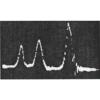Vocabulary Changes in Agatha Christie’s Mysteries as an Indication of Dementia:
A Case Study
Ian Lancashire* and Graeme Hirst†
University of Toronto, *Department of English and †Department of Computer Science
Ian.Lancashire, Graeme.Hirst @utoronto.ca
Introduction
Alzheimer’s disease leads to changes in language production at all levels — lexical, syntactic, and discourse — that are different to or markedly greater than those observed in normal aging (Maxim & Bryan 1994). For example, whereas “the lexicon continues to expand indefinitely until death or illness intervenes”, the “semantic and then phonological output lexicon” becomes progressively “inaccessible” in Alzheimer’s disease (Maxim & Bryan 1994: 3, 24). And while in healthy aging, semantic retrieval speed deteriorates and hence “the number of ‘indefinite’ words may increase” (Maxim & Bryan 1994: 46), as may the number of repeated phrases, Nicholas et al. (1985) demonstrated that both indefinite words and repetitions occur significantly more often in the language of Alzheimer’s patients than in that of healthy people of similar age and level of education.
Interessant onderzoek dat een geheel ander beeld werpt op het ontwikkelen van Alzheimer, niet vanuit de neurologische maar vanuit de linguïstieke kant.
Lees verder hier
Laatste berichten
-
23:25
2013 – Augustus Vraag 3

-
23:07
Rood laserlicht 2

-
23:04
Bruine vlekken op treinaanwijzerbord 5

-
15:28
Vraag 2009 Juli Vraag 5 5

-
12:51
positie 2

-
10:44
Schroefdraad berekening 8

-
24 apr
[scheikunde] Kan chloorgas de geleiding van elektriciteit belemmeren? 9

-
23 apr
Weerfrustratie 9

-
23 apr
geen minkowski-ruimte toch? Doe ik dit nou fout? 15

-
23 apr
do-re-mi-fa-so vliegtuigen 7

-
23 apr
Kunnen quantum Zonnecellen 190% quantum efficiënt zijn 3

-
23 apr
De Euro Nederlandse 100 qubit computer komt eraan

-
23 apr
projectiel 8

-
23 apr
Verschil tussen deze 2 vragen 5

-
23 apr
[scheikunde] berekeningen labo vitamine c bepaling 1

-
22 apr
[wiskunde] rode en witte ballen verdelen 8

-
22 apr
Rotatie van het heelal 41

-
22 apr
Muntje opgooien 14

-
21 apr
Reactiviteit silyl enol ethers 1

-
21 apr
Criterium voor vochtretentie

Nieuwsberichten
-
04 mar
Een nieuw soort magnetisme: altermagnetisme

-
31 okt
AI kan via stem diabetes vaststellen 11

-
21 okt
Einstein krijgt wéér gelijk 45

-
07 feb
witter dan wit 20

-
19 jun
irrigatie en de aardas

Ook veranderingen in taalgebruik kunnen wijzen op Alzheimer
Moderator: Astro
- Moderator
- Berichten: 4.361
Ook veranderingen in taalgebruik kunnen wijzen op Alzheimer
Contra principia negantem disputari non potest.